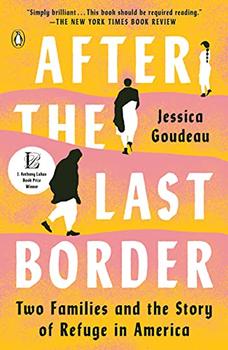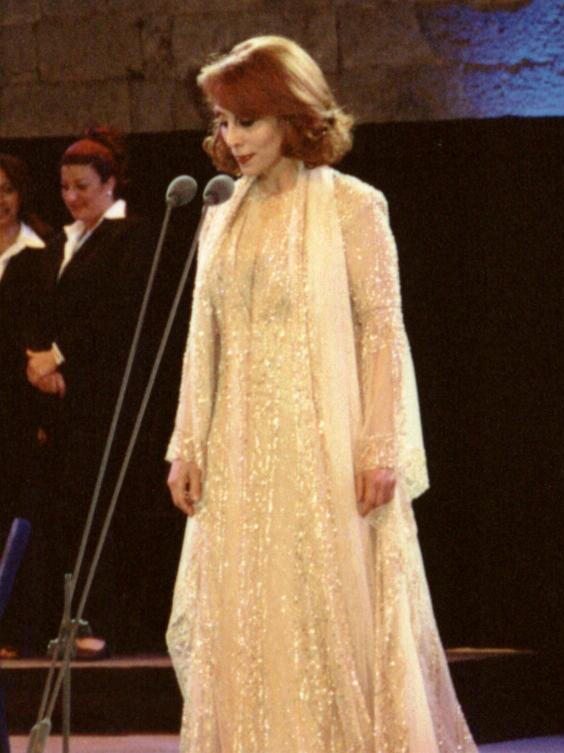Summary | Excerpt | Reading Guide | Reviews | Beyond the Book | Read-Alikes | Genres & Themes | Author Bio

Two Families and the Story of Refuge in America
by Jessica GoudeauThis article relates to After the Last Border
 Fairuz is a Lebanese singer and actress, often hailed as the voice of Lebanon and the voice of hope. Having recorded over 1,500 songs and sold over 100 million records, her body of work is vast and globally admired.
Fairuz is a Lebanese singer and actress, often hailed as the voice of Lebanon and the voice of hope. Having recorded over 1,500 songs and sold over 100 million records, her body of work is vast and globally admired.
Born in the Chouf region in the 1930s with the name Nuhad al-Haddad, her family moved to Beirut when she was young. It was here, singing at a school event in 1950, that she was heard by musician and teacher Mohammed Fleifel, who offered her a spot at the Lebanese Conservatory.
When prominent musician and head of the Lebanese Radio Station Halim El Roumi heard her sing, he insisted she be brought to the airwaves. In the recording studio, he gave her the name Fairuz – with various spellings ranging from Fairouz to Fayruz – which translates to "turquoise," a compliment to her crystalline voice. Fairuz quickly became a hit in the Arab world and she collaborated with numerous other popular artists of the time.
Musically, Fairuz's success can be attributed to both her talent and her distinctive style. She is known for blending musical approaches, balancing traditional and contemporary, Eastern and Western, Christian and Muslim. For example, despite her Christian background, Fairuz's conservatory training emphasized Quranic recitation, resulting in old-world techniques, intonation, pitches and pronunciations. Fairuz will often utilize Islamic imagery and Christian prayers in the same verse. Many of her songs are written in traditional modes, such as maqamat and muwashahat, poetic forms derived from Arab Spain. These influences give Fairuz a distinctly Arabic sound that is widely admired. However, Fairuz equally borrows from Western classical music, weaving in European instrumentation and dance rhythms. For example, her song "Ya Ana Ya Ana" sampled Wolfgang Amadeus Mozart's Symphony No. 40 in G minor. Also, many of her songs are on the shorter side, reminiscent of Western pop music, rather than the longer songs of Arabic music.
In a world where conflict is rampant, Fairuz's music is often associated with coexistence and solidarity. She came of age in the 1940s as Lebanon secured independence from France, an event that likely informed her personal ideals and artistic sensibilities. She famously refused to take sides during Lebanon's civil war from 1975-1990, instead performing only overseas and faithfully returning home to Lebanon after each performance. She also devoted an entire album, Jerusalem in My Heart to recognizing the struggle of Palestinians.
Fairuz has been described as a voice for immigrants, refugees and asylum seekers who strive to balance their lives before and after crossing borders. However, she also sings about drunken neighbors in the village, family dinners at the table and the scent of jasmine. The personal and the political are equally evocative. For many, she is a thread to what is loved, what was left and what is remembered. She also paves a path for what the future can look like if people from all walks of life learn to embrace one another.
In After the Last Border by Jessica Goudeau, a Syrian refugee named Hasna associates Fairuz's voice with home. For decades, Hasna lived in her cherished home, playing Fairuz's records while sipping morning coffee. Her voice was a companion. Parting with those records and the other commodities of her home affected Hasna deeply, but she was forced to leave behind everything she knew to escape war.
Photo of Fairuz in concert in Beiteddine, 2001 by Fletchergull
Filed under Music and the Arts
![]() This "beyond the book article" relates to After the Last Border. It originally ran in August 2020 and has been updated for the
August 2021 paperback edition.
Go to magazine.
This "beyond the book article" relates to After the Last Border. It originally ran in August 2020 and has been updated for the
August 2021 paperback edition.
Go to magazine.
Your guide toexceptional books
BookBrowse seeks out and recommends the best in contemporary fiction and nonfiction—books that not only engage and entertain but also deepen our understanding of ourselves and the world around us.